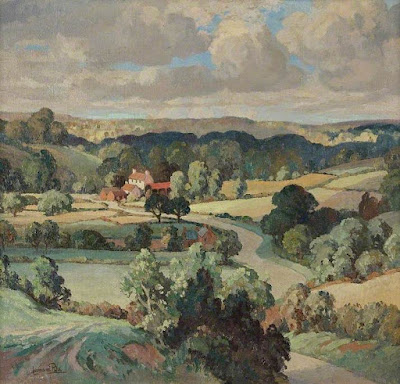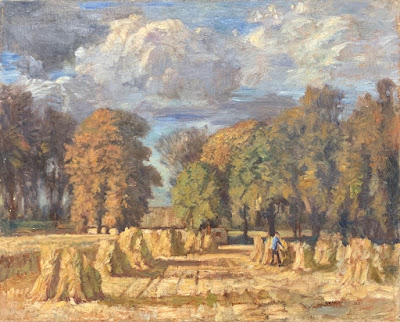Over the past two months I have spent much of my reading time moving back and forth within the Spring volume of R. H. Blyth's four-volume Haiku. The set has been with me for more than 40 years. I bought it in a used bookstore in Seattle when I was attending law school. I had discovered Blyth's haiku translations a few years earlier, but finding copies of Haiku to purchase in those pre-internet days was difficult: the four volumes had been published in small quantities in Tokyo between 1949 and 1952, and thus were scarce. I was surprised and delighted to finally come across a lovely full set as I idly browsed one afternoon in the Asian literature section of one of my favorite bookstores. The back endpaper of Volume I (Eastern Culture) still bears the bookseller's pencilled notation: "$65 for 4 volumes." In my law student days, $65 was an exorbitant sum to spend on a book purchase, but I felt I had no choice. Now, four decades later, the volumes sit beside me as I write this.
Given the number of times I have posted haiku translated by him, I suspect that the name "R. H. Blyth" appears in First Known When Lost more often than any other name. Blyth, who was born in England in 1898 and died in Japan in 1964, was a remarkable man, with wide-ranging interests (which included, in addition to haiku, Zen Buddhism, and English poetry, a passion for the music of Bach). He travelled to Seoul in 1924 to teach in a Japanese-operated university, and then moved to Japan in 1940, where he taught in various schools and universities. By the time he moved to Japan, he had learned both Japanese and Chinese, and had made his first attempts at translating Japanese and Chinese poetry. He had also begun to study and practice Zen Buddhism.
He was still residing in Japan when the Second World War began. As was the case with all foreign residents who were citizens of nations at war with Japan, he was confined in an internment camp throughout the War. After the War ended, he served as a "counselor" to the Imperial Household, and, in that role, provided advice to General Douglas MacArthur during the occupation period. He also began to act as a private tutor to the Crown Prince (and future Emperor), Akihito. He was well-known and respected in Japan in the pre-War period for his knowledge of, and admiration for, Japanese culture. This respect deepened as a result of the wise and practical advice he provided to MacArthur and other occupation officials during the post-War period. His advice was driven by his love for Japan: his goal was to help protect and preserve the Japanese cultural heritage. [This outline of Blyth's life is based upon the excellent biographical "Introduction" in Norman Waddell's Poetry and Zen: Letters and Uncollected Writings of R. H. Blyth (Shambhala 2022), pages 1-51. The book is an invaluable collection, and I highly recommend it.]
Stanley Spencer (1891-1959)
"The Ferry Hotel Lawn, Cookham" (1936)
All of this is by way of introduction to Blyth's Haiku. As you have likely deduced, dear readers, I am not in the least neutral about Haiku. I sometimes wonder whether my judgment about it is clouded by having encountered it at a relatively young age: am I still caught up in a youthful romantic daydream? But I have discovered over the years that others have been equally entranced by the four volumes.
For instance, a few years ago I came across this notebook entry by Philippe Jaccottet, written in 1960 (when he was 35): "R. H. Blyth's Haiku, essential. . . . I could quote pages. While reading these four volumes, it occurred to me more than once that they contained, of all the words I have ever managed to decipher, those closest to the truth." (Philippe Jaccottet (notebook entry, August of 1960) (translated by Tess Lewis), in Philippe Jaccottet, Seedtime: Notebooks, 1954-1979 (Seagull Books 2013), pages 52-53.) I was astounded and gratified to happen upon these comments by Jaccottet. He articulates (far better than I can) exactly how I have felt when reading Haiku over the past forty or so years.
This spring I once again returned to Blyth's wondrous creation: revisiting old favorites, being reminded of haiku I had once read but had forgotten, and making new discoveries.
A pear tree in bloom:
In the moonlight,
A woman reading a letter.
Buson (1716-1784) (translated by R. H. Blyth), in Blyth, Haiku, Volume II: Spring (Hokuseido Press 1950), page 323.
A night of stars;
The cherry blossoms are falling
On the water of the rice seedlings.
Buson (translated by R. H. Blyth), Ibid, page 170. Please bear with me: this haiku appeared in my post of May 24, but I think it goes well with Buson's pear tree haiku, so I repeat myself. It has long been one of my favorite haiku: three lovely images in succession, and a fourth unstated image -- the stars reflected in the water, floating on the dark surface with the cherry blossom petals, both amidst the green shoots of the rice seedlings.
The cherry blossoms blooming,
Those I remember
All far away.
Shiki (1867-1902) (translated by R. H. Blyth), Ibid, page 348.
How many, many things
They call to mind,
These cherry blossoms!
Bashō (1644-1694) (translated by R. H. Blyth), Ibid, page 347.
Further thoughts by Philippe Jaccottet on haiku:
"Japanese haiku masters, who grasp in passing a shimmer in its impermanence and consider the frailest things to have the greatest value and the most power, are not mystics. You could not imagine calling them 'ardent,' or even that they climbed mountain peaks. They remind me more of those servants, in André Dhôtel's The Man of the Lumber Mill, who suddenly see the pure gleam of a garden reflected in the silverware or crystal glasses that they are cleaning."
Philippe Jaccottet (translated by John Taylor), "Notes from the Ravine," in Philippe Jaccottet, And, Nonetheless: Selected Prose and Poetry, 1990-2009 (Chelsea Editions 2011), page 303.
Stanley Spencer, "Landscape in North Wales" (1938)
The three seasonal volumes of Haiku (Volume II: Spring; Volume III: Summer-Autumn; Volume IV: Autumn-Winter) consist of collections of haiku organized according to general seasonal categories that are used in all three volumes: "The Season," "Sky and Elements," "Fields and Mountains," "Gods and Buddhas," "Human Affairs," "Birds and Beasts," and "Trees and Flowers." In addition, within each of the general categories, Blyth collects haiku based upon their particular seasonal word or phrase. Thus, for example, in the "Trees and Flowers" chapter of the Spring volume there are groups of haiku relating to cherry blossoms, plum blossoms, pear blossoms, willow trees, camellias, "grasses of spring," and ten other seasonal words or phrases. The result of Blyth's knowledge and labor is astonishing, and a gift to us all: Spring consists of 382 pages; usually, at least two to three haiku (often more) appear on each page; hence, the volume likely contains more than a thousand haiku.
The sheer volume may seem forbidding, but it is not. Or so it seems to me. Something that Philip Larkin wrote about Thomas Hardy's Collected Poems applies to how I feel about Blyth's Haiku: "may I trumpet the assurance that one reader at least would not wish Hardy's Collected Poems a single page shorter." (Philip Larkin, "Wanted: Good Hardy Critic," in Larkin, Required Writing: Miscellaneous Pieces, 1955-1982 (Faber and Faber 1983), page 174.) (An aside: I completely agree with Larkin's assessment of Hardy's Collected Poems as well.)
To return, then, to spring:
The soft breeze,
And in the green of a thousand hills,
A single temple.
Shiki (translated by R. H. Blyth), in Blyth, Haiku, Volume II: Spring, page 100.
In the midst of the plain
Sings the skylark,
Free of all things.
Bashō (translated by R. H. Blyth), Ibid, page 198.
The sea of spring,
Rising and falling,
All the day long.
Buson (translated by R. H. Blyth), Ibid, page 135.
The lights are lit
On the islands far and near:
The spring sea.
Shiki (translated by R. H. Blyth), Ibid, page 135.
Tilling the field;
From the temple among the trees,
The funeral bell tolls.
Buson (translated by R. H. Blyth), Ibid, page 161.
Tilling the field:
The man who asked the way
Has disappeared.
Buson (translated by R. H. Blyth), Ibid, page 165.
Stanley Spencer, "Rock Gardens, Cookham Dene" (1947)
To repeat Philippe Jaccottet's thoughts about Blyth's Haiku: "While reading these four volumes, it occurred to me more than once that they contained, of all the words I have ever managed to decipher, those closest to the truth." Blyth has brought these words to us. Something that Jaccottet wrote at another time, but not about Blyth, and not about haiku, also comes to mind:
"Attachment to the self renders life more opaque. One moment of complete forgetting and all the screens, one behind the other, become transparent so that you can perceive clarity to its very depths, as far as the eye can see; and at the same time everything becomes weightless. Thus does the soul truly become a bird."
Philippe Jaccottet (notebook entry, May of 1954) (translated by Tess Lewis), in Jaccottet, Seedtime: Notebooks, 1954-1979, page 1.
Simply trust:
Do not also the petals flutter down,
Just like that?
Issa (1763-1828) (translated by R. H. Blyth), in Blyth, Haiku, Volume II: Spring, page 363.
Stanley Spencer, "Scarecrow, Cookham" (1934)
























